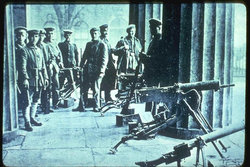German Revolution
|
|
The German Revolution describes a series of events that occurred in 1918-1919, culminating in the overthrow of the Kaiser and the establishment of a democratic republic. Like the Russian February Revolution, no single political party led the rebellion, and workers' councils similar to the soviets seized power across the country. However, the events continue to polarise the Left, not least because of the use of the right-wing Freikorps paramilitaries by the Social-Democratic government in order to suppress the far-left Spartacist revolt.
Like the Russian Revolution, the German Revolution occurred in the context of the disastrous consequences of World War I. The concession of defeat in war by the Supreme Command under Erich Ludendorff triggered a political crisis, leading to the assumption of power by the liberal Prince Max von Baden. Although the main mass workers' party, the Social-Democratic Party, participated in the Government, this proved insufficient in preventing rebellion.
The uprising began in Kiel on 4 November 1918, when forty-thousand sailors and marines took over the port in protest at a proposed engagement with the British Navy by German Naval Command, despite the fact it was clear that the war had been lost. By 8 November, Workers' and Soldiers' Councils had seized most of Western Germany, laying the foundations for the so-called Räterepublik ("Council Republic"). The Kaiser was forced to abdicate on 9 November, ending the German Monarchy. The SPD were catapulted into power as rulers of the new republic alongside their more radical counterparts, the Independent Social Democratic Party (USPD).
However, the united front disintegrated in late December 1918 as the USPD left the coalition in protest at perceived SPD compromises with the (capitalist) status quo. Furthermore, a second revolutionary wave swept Germany in January 1919, led by the communist revolutionary Spartacist League. In response, the Social-Democratic leader, Friedrich Ebert employed nationalist militia, the Freikorps, to suppress the uprising. The two most famous victims of this counter-revolutionary operation were the Spartacist leaders Karl Liebknecht and Rosa Luxemburg, who were murdered on 15 January 1919. By May 1919, the revolutionary Left were routed.
The German Revolution laid the foundations for the Weimar Republic, a parliamentary democracy that was plagued by instability and polarisation, and that was hit by a series of social crises which ended with its destruction in 1933 at the hands of the Nazis under Adolf Hitler.
See also
External links
- An overview of the German Revolution (http://mars.acnet.wnec.edu/~grempel/courses/germany/lectures/18rev1918.html) by Gerhard Rempel of Western New England College
- Three texts on the German Revolution (http://www.geocities.com/Athens/Acropolis/8195/ger_int.htm) written by council communists
- Library of materials on the German Revolution (http://www.marxists.org/subject/germany-1918-23/) at marxists.org
de:Novemberrevolution nl:Novemberrevolutie ro:Revoluţia din Germania

